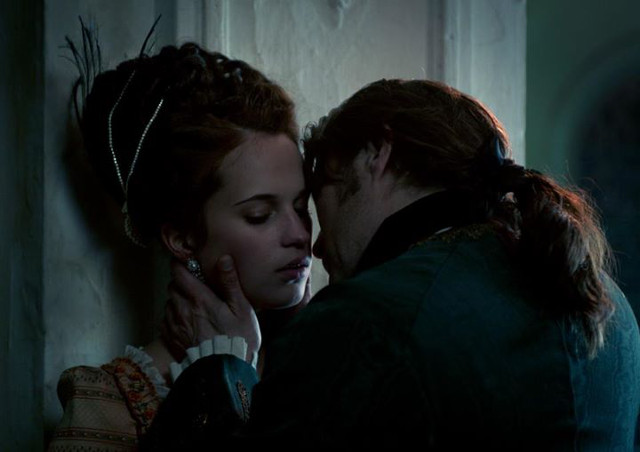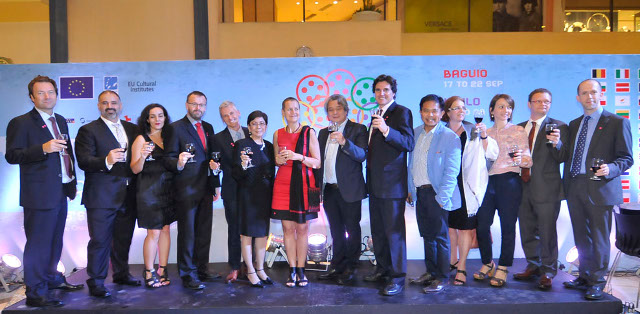SUMMARY
This is AI generated summarization, which may have errors. For context, always refer to the full article.

MANILA, Philippines – Once upon a time, in a kingdom far away, Denmark’s Queen Caroline Matilda had a love affair with the royal family’s physician, Johann Friedrich Struensee, that caused a scandal and changed the course of the nation.
The queen was married to the psychologically challenged and emotionally dependent King Christian VII.
This is the subject of “A Royal Affair,” the historical drama with a back story that still finds meaning in our time – romance being always the afterglow of the otherwise bleak and complex human condition.
The film opened the Cine Europa Film Festival, now on its 16th year in the Philippines.
The festival, supported by Europe’s diplomatic community here, aims to strenghen ties between Europe and the Philippines through the long-interactive global film industry – in which the Philippines plays an active role.

The considerable viewership elicited by this festival shows the increasingly cosmopolitan openness among Filipino moviegoers, even alongside the predominant appeal of local showbiz.
Denmark’s “Royal Affair” – which won two Silver Bears at the prestigious Berlin film festival in 2012 and was nominated in the foreign-language film category of the 2013 Golden Globe and Oscars – presents a historical chapter that is much spicier and more volatile than today’s celebrity scandals.
After all, the film is partly based on an erotic novel, Bodil Steensen-Leth’s “Prinsesse af blodet” – whose narrative is from the Danish queen’s point of view.
Queen Caroline Matilda, also known as Caroline Matilda of Great Britain, was the youngest sibling of King George III of the United Kingdom. At 15, she was sent off to Denmark to marry her cousin, Christian VII. This was 1766 – the year this mentally ill heir became king.
Danish stars Mikkel Folsgaard, who won best actor in Berlin, plays the demented king, and Mads Mikkelsen (the villain in Daniel Craig’s first James Bond, “Casino Royale”) plays the freethinking physician Struensee.
Swedish actress Alicia Vikander portrays Caroline Matilda.
Debauchery
The film begins with the adolescent Mathilde trying to make sense of her transition, as she is married off to a cousin she never met, until now.
Christian turns out to be a young man with a stunted mind. Yet he’s a royal who will soon be obliged to fulfill his duty – in this case, the heavy affairs of state.
He also turns out to be a party animal, and a rake. The bars and restos back then were saloons, “full of whores with big breasts,” as he is portrayed in the film as describing.
This part of the movie may be qualified as a period sex comedy. As the character of Dr. Struensee is introduced into the narrative, he becomes acquainted with a guardian named Reventlow, who describes Christian thus, “He’s been difficult since childhood but I think most of his problems stem from excessive masturbation.”
Christian’s excesses may now be historical record but are still startling to behold on film. Apart from his alcoholism, he indulges in rampant sex with men and women alike. Whoring is a pastime and S&M is a specialty.
Apart from his wanton lifestyle, Christian is also a lover of the theater. He knows his Shakespeare, and he’s at his most relaxed watching the performances, reciting the lines simultaneously with the actors on stage from his balcony.
But the King’s men know how unfit he is for the business of government, which they take upon themselves to rule, having distracted the King with a young boy shipped from Africa.
How dull today’s scandals in that light, and so is the developing, more earnest love affair between Dr. Struensee and the Queen.
Enlightenment
It’s actually the King who introduces them. “The world’s full of princesses and I got stuck with the grumpy one,” he says to Struensee about his wife, whom he also describes as a “total bore.”
The King’s instruction to Dr. Struensee is to make her “exciting.” Little would the doctor anticipate that he would take this to a literal level, to his joy and pain.
The brain being the sexiest organ, as they say, the Queen becomes stimulated by his progressive ideas, which accord with the Enlightenment.
It starts with the Queen borrowing a book by Rousseau from Struensee’s small library. The freethinker that he is, Struensee shares his ideas willingly.
They go horseback-riding. They wander to the edge of the kingdom and the Queen sees for herself the poverty and injustice in Christian’s rule. They come across a widow crying over the body of her murdered husband who had been tortured by his master.
Power behind the throne
Struensee’s liberal ideas influence both the Queen and even the King, whom Struensee persuades to step out of his nominal role and become more hands-on in the administration of his kingdom.
“Why don’t you act like a king and preside over the Royal Court?” says Struensee, playing on the King’s passion for theater.
The King begins to assert his authority but actually remains a figurehead – this time under Struensee’s influence, which also emboldens the Queen to wield her influence in state affairs.
A wave of reforms follows, to the chagrin and anxiety of the aristocracy.
Laws are changed, censorship is abolished, the tax collection is reformed – the Enlightenment finds its principles practiced from the levers of the monarchy.
Struensee wields power and has the Queen all to himself in a country home, while the King’s mental health deteriorates.
The writer Voltaire, the hero of the Enlightenment, writes a letter to the King, commending his reforms.
But this reign of liberty ends soon enough as the aristocracy plots against Struensee and the Queen, whose indiscretions also lead in no small measure to their downfall.
The Queen is imprisoned and later exiled to a castle, but this time on the watch of her British family. Struensee is served a grisly execution.
There are tours in Copenhagen that trace this now historic romance, widely appreciated in a country that already exemplifies the modernity envisioned by the Enlightenment.
The film is yet another tribute to that episode. “A Royal Affair” indeed recounts a grand story. – Rappler.com
Here’s the trailer:
Add a comment
How does this make you feel?
There are no comments yet. Add your comment to start the conversation.